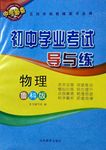题目内容
I wanted______cold meat but there was ______ left.
|
A.some more ; no one |
B.any more ; nothing |
|
C.much more ; neither |
D.some more; none |
【答案】
D
【解析】略

练习册系列答案
 七星图书口算速算天天练系列答案
七星图书口算速算天天练系列答案 初中学业考试导与练系列答案
初中学业考试导与练系列答案
相关题目